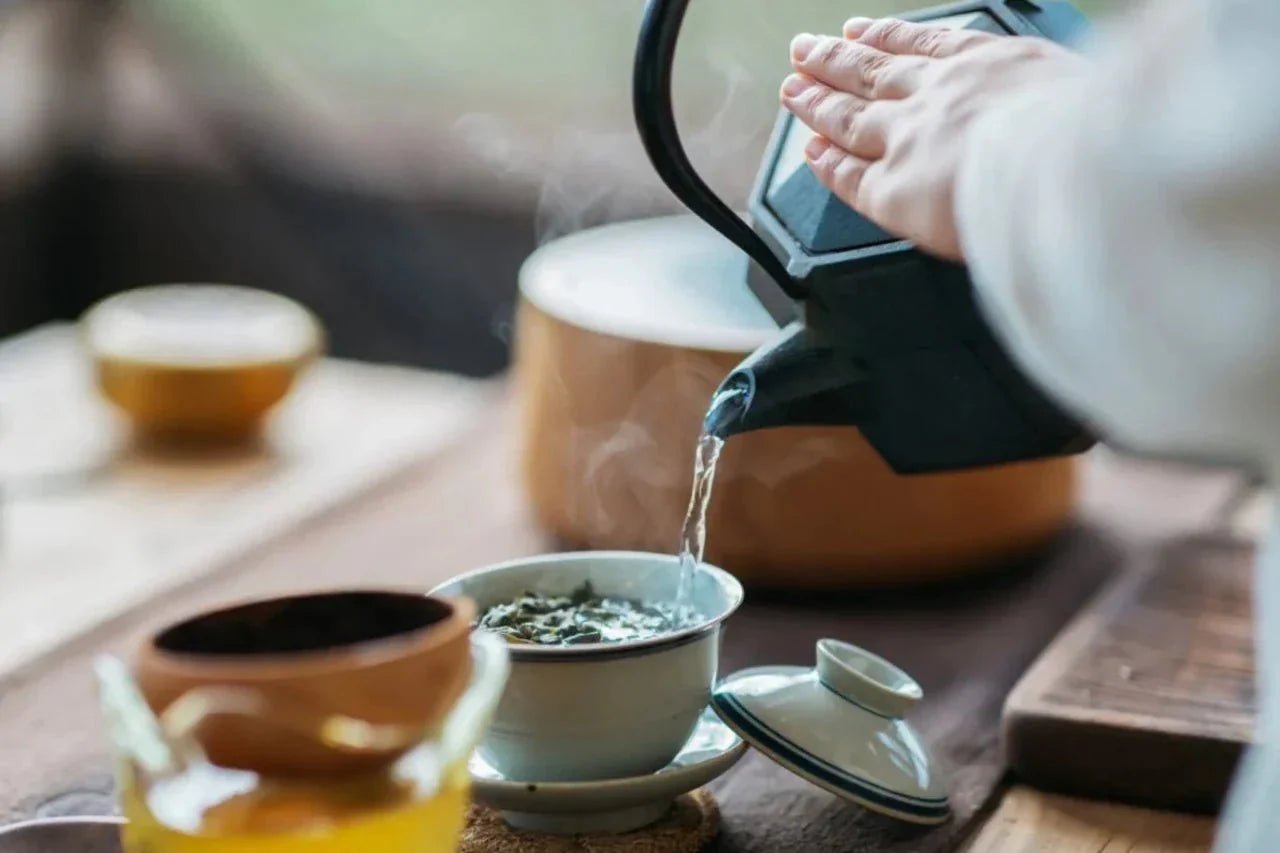No Products in the Cart

Sleep is one of the most important aspects of overall well-being, yet many people struggle with falling asleep, staying asleep, or feeling refreshed in the morning. Whether it's stress, an overactive mind, or an inconsistent sleep schedule, poor sleep can lead to fatigue, irritability, and long-term health issues.
While sleeping pills may offer quick relief, they often come with side effects and the risk of dependency. A gentler, natural solution is herbal tea—a time-honored remedy for relaxation and restful sleep. Many herbs have been used for centuries to calm the nervous system, ease stress, and promote deep, restorative sleep.
If you're looking for a natural and effective way to improve your sleep quality, this guide will explore the best herbal teas for sleep, how they work, and the best ways to incorporate them into your nightly routine.
Drinking herbal tea before bed is a simple ritual that helps signal to your body that it’s time to unwind. Unlike caffeinated drinks, herbal teas contain calming plant compounds that promote relaxation, reduce stress hormones, and gently prepare the body for sleep.
Some of the ways herbal teas support sleep include:
Promoting relaxation – Certain herbs contain natural sedatives that calm the nervous system.
Reducing cortisol levels – High levels of cortisol (the stress hormone) can keep you alert at night. Herbal teas can help lower cortisol levels, making it easier to relax.
Regulating circadian rhythms – A consistent tea-drinking ritual before bed can train your body to recognize when it’s time to rest.
Easing muscle tension – Many sleep-supporting herbs have anti-inflammatory and muscle-relaxing properties that help your body physically unwind.
Unlike melatonin supplements, which directly affect hormone levels, herbal teas work naturally with your body’s systems, making them a gentle, long-term sleep solution.
If you’re wondering what is the best herbal tea for deep sleep, here are the top herbs known for their relaxing and sleep-promoting properties:
Chamomile is one of the most well-known natural sleep aids. This mild, floral tea contains apigenin, an antioxidant that binds to receptors in the brain, reducing anxiety and promoting drowsiness.
Why it works:
✔ Relieves stress and tension
✔ Encourages relaxation without grogginess
✔ Soothes digestion, which can also improve sleep
Best time to drink: 30-45 minutes before bed for a calming effect.
Pro Tip: Chamomile tea pairs well with honey, which contains natural compounds that support melatonin production.
Valerian root is a powerful herbal sedative used for centuries to treat insomnia and nervous tension. Unlike chamomile, which promotes gentle relaxation, valerian actively increases the levels of GABA (gamma-aminobutyric acid), a neurotransmitter that calms the brain and nervous system.
Why it works:
✔ Helps fall asleep faster
✔ Reduces nighttime anxiety
✔ May improve sleep quality over time
Best time to drink: 30 minutes to 1 hour before bedtime.
Pro Tip: Valerian root has a strong, earthy taste. Mixing it with chamomile or lavender can make it more pleasant to drink.
Lavender is widely known for its calming scent, but drinking lavender tea has additional benefits. It works by reducing anxiety, lowering heart rate, and promoting overall relaxation.
Why it works:
✔ Calms the nervous system
✔ Helps with stress-related sleep disturbances
✔ Has a naturally pleasant aroma that enhances relaxation
Best time to drink: 1 hour before bed for maximum relaxation.
Pro Tip: Try combining lavender tea with chamomile for a floral, sleep-enhancing blend.
Passionflower tea is often used for reducing anxiety and improving sleep quality. It contains compounds that boost GABA levels, similar to valerian root, making it highly effective for calming the mind and promoting deep sleep.
Why it works:
✔ Eases restlessness and mental overactivity
✔ Supports deep, uninterrupted sleep
✔ May improve sleep cycles when consumed regularly
Best time to drink: 30-60 minutes before bed.
Pro Tip: If you have trouble staying asleep, passionflower tea may help prevent nighttime wakeups.
For herbal tea to be most effective as a sleep aid, it’s important to drink it the right way.
30-60 minutes before bed – Gives your body time to absorb the calming compounds.
After a warm shower or bath – Enhances relaxation and prepares your body for sleep.
As part of a bedtime ritual – Helps train your body to recognize sleep cues.
Herbal teas work best when consumed consistently. Try drinking a cup every night for 2-3 weeks to experience long-term improvements in sleep quality.
Brewing herbal tea with boiling water can destroy some of the delicate sleep-enhancing compounds. Aim for a temperature around 175°F (80°C) for best results.
Caffeine (found in some teas like green or black tea) can interfere with sleep, so always choose caffeine-free herbal teas before bed.
Excess sugar can cause blood sugar spikes, disrupting sleep. Instead, use a teaspoon of honey for a natural sweetness that also supports melatonin production.
Choosing a premium, organic herbal tea ensures you get maximum benefits without artificial additives.
Baraguz offers a range of herbal teas designed to support relaxation and overall wellness.
Some options that may support better sleep include:
Baraguz Health Herbal Teas – A collection of natural, calming herbal blends that promote relaxation and well-being.
Baraguz SlimT Night Cleanse – A gentle, caffeine-free tea that supports digestion and relaxation, making it a great evening option.
Many people turn to melatonin supplements for sleep, but herbal tea offers a more natural, gentle approach. Instead of directly altering hormone levels, herbal teas work with your body’s natural systems to reduce stress, calm the nervous system, and encourage restful sleep.
By incorporating chamomile, valerian root, lavender, or passionflower into your bedtime routine, you can create a sustainable, long-term sleep solution without the side effects of synthetic sleep aids.
If you’re looking for an easy, natural way to improve your sleep, try making a cup of high-quality herbal tea part of your nightly ritual.
Explore Baraguz’s Herbal Tea Collection and discover the perfect blend for deep, restful sleep.